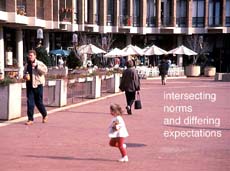The terms
norm and
expectation can be used more or less synonymously. In the social sciences a norm is a particular kind of expectation. There is a distinction that can be made, however, because the two kinds of expectations can be in tension with one another. If we have a habit of standing by the window when we talk about our budget, but there is no norm that we should do so, it will be unexpected if we talk about the budget elsewhere, but this will not be inappropriate. If, on the other hand, there is a norm that budget talk should be done at the window, then, supposing that we hardly ever do talk about the budget there, it will be inappropriate, though not unusual, that we talk budget elsewhere. Indeed it may even be expected that the action will be done at a normatively inappropriate location. Such a combination adds to the complexity of the place, since trajectories of action have to weigh different directives.
Explicit norms may be established or
changed by public debate. Other norms are accepted and continued without much awareness. Expectations can get established by repetition; patterns can develop without our noticing, and begin
to structure our expectations and actions.
The relations between expectation and avowal of norms can get quite intricate. For instance, there might be cases where an action is done only once at a certain location but is done because you anticipate, from background knowledge, that there would be a habitual expectation that it be done there if there were a relevant community. There is a subtle difference between erecting a tent by the stream in the anticipation that when they arrive your fellow campers will agree that it is appropriate there, and erecting a tent there because you imagine that it's the place where people would erect tents.
[Objection!]- [Nearby: Place grammar outline -- Introducing discontinuity -- Places and oppression ]
